|
|
|
Sort Order |
|
|
|
Items / Page
|
|
|
|
|
|
|
| Srl | Item |
| 1 |
ID:
096926
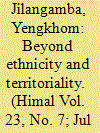

|
|
|
| 2 |
ID:
113808
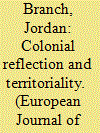

|
|
|
|
|
| Publication |
2012.
|
| Summary/Abstract |
The modern international system is commonly argued to have originated within Western Europe and spread globally during centuries of colonialism. This article argues, instead, that the character of the modern system of territorially sovereign states resulted from a complex interaction between European colonizing polities and events, actors, and spaces in other parts of the globe. In particular, through a process of colonial reflection, many of the foundational ideas and practices of modern statehood were formed in the interactions of Europeans with the unknown, supposedly empty, spaces of the New World in the 16th and 17th centuries. These novel practices were applied only later to politics among states in Europe. Most important among these developments is the ideal of territorial exclusivity as the sole basis for state sovereignty. This analysis also has implications for the study of contemporary international systemic change.
|
|
|
|
|
|
|
|
|
|
|
|
|
|
|
|
| 3 |
ID:
103669
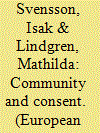

|
|
|
|
|
| Publication |
2011.
|
| Summary/Abstract |
This study explores popular challenges against the state through nonviolent means. Although previous research has started to examine the effect of these 'unarmed insurrections', the relationship between challenging the state apparatus (vertical legitimacy) and the state identity (horizontal legitimacy) has not been adequately addressed. We argue that unarmed insurrections are most likely to be successful when challenging the vertical, rather than the horizontal, legitimacy of the state. Studying data for 287 years of protests in 57 non-democratic countries during the period of 1946-2006, we find support for three implications of this proposition: 1) campaigns that demand governmental regime change are more successful than campaigns for territorial changes; 2) success is less likely when the identity of the insurgents and the government is split along ethnic lines; and 3) success is less likely when society is highly polarized along ethnic lines rather than being ethnically homogeneous. Thus, when the community is divided, the efforts to withdraw consent will be less effective. The study discusses the implications of these findings for policymakers and scholars interested in nonviolent strategic action.
|
|
|
|
|
|
|
|
|
|
|
|
|
|
|
|
| 4 |
ID:
149645
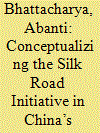

|
|
|
|
|
| Summary/Abstract |
While the Silk Route Initiative (SRI) appears to be a novel foreign policy strategy under Xi Jinping’s leadership, it is integral to China’s periphery policy (zhoubian zhengce). Arguably, periphery policy is rooted in the Chinese imperial history and has remained a salient aspect of state formation and foreign policymaking of the post-1949 China. Under Xi Jinping, it has acquired a preeminent foreign policy goal. This study puts the SRI in a historical framework and argues for the centrality of periphery in China’s domestic and foreign policy. Looking at the SRI from the prism of periphery, while suggesting an essential continuity in Chinese foreign policy and strategic thinking, also indicates that periphery is not simply a frontier strategy. Rather, it encompasses the whole gamut of Chinese domestic and foreign policy. Embedded thus in the periphery policy, the SRI is a well thought-out Chinese grand strategy to reclaim its geopolitical dominance in Asia and fulfill the goal of “China dream.” This strategy, in effect, challenges the US dominance and de-centers it from Asia and helps China to create a Chinese-centered order in Asia and beyond.
|
|
|
|
|
|
|
|
|
|
|
|
|
|
|
|
| 5 |
ID:
157944
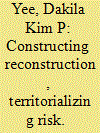

|
|
|
|
|
| Summary/Abstract |
Analysis of post-disaster reconstruction of urban areas has largely been understood as a function of technocratic and institutionalist paradigms, while critical perspectives have been largely influenced by the analysis of “disaster capitalism.” Common to these paradigms is little analysis of state attempts to deploy power over a population through controlling space in urban areas. This paper examines the strategies of internal territorialization undertaken by the Philippines state in post-Haiyan reconstruction polices. Drawing on data from Tacloban City, I show how bourgeois environmentalist and urban ecological security approaches exclude the urban poor from undertaking reconstruction in coastal communities. Discourses of cleanliness and securing the population of the city have accompanied material practices that enforce state territorialization in the city. These processes of state territorialization exclude those residing in risk prone zones from various forms of aid and relief. This paper concludes by highlighting processes of territorialization that have generated conflict in the city, as poor residents engage in forms of counter-territorialization to assert their space in the city.
|
|
|
|
|
|
|
|
|
|
|
|
|
|
|
|
| 6 |
ID:
110779
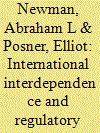

|
|
|
|
|
| Publication |
2011.
|
| Summary/Abstract |
This article revisits a fundamental question of international political economy: when does cross-border economic interdependence become a source of power. The view that economic interdependence is a source of potential power, not just mutual benefits, has a long lineage traceable to political realism, organizational economics, Ricardian trade theory, and structural Marxism, and researchers typically focus on preferred causal variables in isolation. Despite important contributions, little attention has been paid to understanding the interactions of multiple perspectives on asymmetric interdependence, or to making sense of contradictory expectations of the various models. As a consequence scholars engaged in globalization debates, such as those about policy convergence or private actor governance, frequently talk past one another. To deduce expectations about the relationship between power and interdependence, we build a model synthesizing standard approaches that analyze the effects of market size and market scope separately, and then add the critical variable of jurisdictional boundaries. By decoupling geography and authority, our analysis produces a respecification of classic interdependence models and advances core international political economy debates concerning power dynamics in a globalized economy.
|
|
|
|
|
|
|
|
|
|
|
|
|
|
|
|
| 7 |
ID:
127654


|
|
|
|
|
| Publication |
2013.
|
| Summary/Abstract |
Recent decades have seen significant advances in research on the relationship between nationalist ideology and organized violence. New scholarship has paid much closer attention to the microdynamics of violence, the strikingly uneven distribution of violence, the relationship between master cleavages and intimate local and personal struggles, and to process, history, and contingency. Nationalist ideology is understood to be bound up intimately with institutions and with everyday relationships at the local level. We introduce the contributions to this special issue, outlining the way in which they highlight the power of ideas, narratives, and microlevel solidarity in mobilization for violence and how they address the crucial importance of territoriality in linking ideas and action.
|
|
|
|
|
|
|
|
|
|
|
|
|
|
|
|
| 8 |
ID:
180229
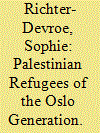

|
|
|
|
|
| Summary/Abstract |
This article analyzes the political narratives and critiques of young Palestinian refugees who have grown up in the bleak post-Oslo period. Based on ethnographic fieldwork and interviews conducted with refugee youth in Jordan and the West Bank between 2009 and 2014, I show that this generation of refugees endorses a collective Palestinian identity and peoplehood with claims to the (home)land while also narrating their identities and relations to land, nation, state, and rights as complex, multifaceted, and fractured. Their political imaginaries do not limit the political and epistemic project of decolonizing Palestine to the classic paradigm of a territorialized nation-state as enshrined in the Oslo two-state agenda. Rather, they point to a creative and radical, post-nation-statist, translocal politics for Palestine.
|
|
|
|
|
|
|
|
|
|
|
|
|
|
|
|
| 9 |
ID:
177557
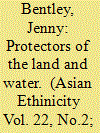

|
|
|
|
|
| Summary/Abstract |
In Sikkim, India, indigenous activists protesting against dams in their reserve, Dzongu, have turned ancestral territorial boundedness into a political resource and asserted that all Lepcha have stakes in Dzongu’s future, reconceptualising citizenship as not defined by the Indian government or the subnational states of Sikkim and West Bengal, but as deriving from the relations of the Lepcha to their ancestral territory that spans present-day borders. I analyse this reconceptualization and the strong local resistance against it along three modalities: the temporality of historical boundedness, the spatiality of the traditional territory, and the polysemy of territorial relations. I conclude that the indigenous cross-border claims failed to be sustained as political action due to the legacy of state institutions as welfare providers, the vulnerability of Sikkimese belonging, and the non-inclusion of local understandings of the sacred Dzongu landscape. This article contributes to the debate on polysemic territoriality, citizenship, resistance and vulnerability.
|
|
|
|
|
|
|
|
|
|
|
|
|
|
|
|
| 10 |
ID:
174811
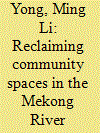

|
|
|
|
|
| Summary/Abstract |
In Northern Thailand's Chiang Khong district, which lies along the banks of the Mekong River and the Thai‐Lao border, an community‐based environmental movement under the leadership of the Rak Chiang Khong conservation group emerged in response to processes that have appropriated territories traditionally used by locals for state‐led economic exploitation. The Rak Chiang Khong has put up fierce opposition to large‐scale development projects such as the China‐led navigation project, which planned to blast ecologically and culturally significant rapids, and hydropower dam development along the Mekong River. As a result, local‐level governance arrangements of the transboundary commons in Chiang Khong have shifted to counter threats both within and beyond the borders of Thailand. Through adapting fishing arrangements, engaging in community‐led research and establishing village conservation zones, overlapping forms of territorialisation have emerged in response to socio‐ecological changes to the river. These new forms of territorialisation are produced by complex configurations of political, cultural, and ecological histories, politicaleconomic changes, and transboundary dynamics. These territorial strategies have been key towards reclaiming the transboundary commons of the Mekong River for riparian communities, and providing a deeper understanding of the values that drive community involvement in the transboundary environmental governance of the Mekong River.
|
|
|
|
|
|
|
|
|
|
|
|
|
|
|
|
| 11 |
ID:
110210
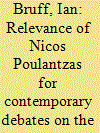

|
|
|
|
|
| Publication |
2012.
|
| Summary/Abstract |
This article argues that in many cases the theoretical resources for a revived and enriched 'critical International Political Economy' already exist, and we would do well to revisit earlier works when seeking to intervene in contemporary debates. Through an initial engagement with the recent plethora of contributions on 'the international', I contend that Nicos Poulantzas' later writings deserve a rereading. In particular, his work on the historicity of territory and the internationalisation of capital constitutes a series of rich and suggestive commentaries. The significance of his remarks are later illustrated via a consideration of Germany, where I argue that the changes wrought by the growing imbrication of the German economy with transnational circuits of capital have been taking place through, and not necessarily against, the historicity of German capitalism's emergence and evolution.
|
|
|
|
|
|
|
|
|
|
|
|
|
|
|
|
| 12 |
ID:
112070
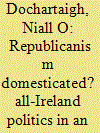

|
|
|
|
|
| Publication |
2012.
|
| Summary/Abstract |
This paper examines some of the key factors working in favour of mutual insulation between the two political jurisdictions in Ireland, factors that contribute to the 'copper-fastening' of partition and that constitute a major obstacle to any Irish Republican project focused on the ending of partition. It outlines the powerful structural forces working for the naturalisation of Northern Ireland as a political unit. It argues that some of these factors are almost entirely independent of political unionism and in certain respects work to copperfasten partition despite the efforts of unionism. It goes on to outline a number of key elements that work against the mutual insulation of the jurisdictions and the domestication of Irish Republican and nationalist politics in a Northern Ireland context, factors that continue to pull the North back into an all-Ireland context despite all of the powerful structural factors working to mutually insulate the politics of the two jurisdictions.
|
|
|
|
|
|
|
|
|
|
|
|
|
|
|
|
| 13 |
ID:
147722
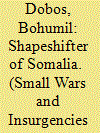

|
|
|
|
|
| Summary/Abstract |
The article presents the application of a concept of political territoriality in the case of Al-Shabaab. It first presents territoriality as a human strategy based on control of territory. Hereinafter, the set of criteria for the examination of political territoriality is presented. It concludes that given the development of Al-Shabaab, we can identify three distinct periods connected to the ′organization’s relation to territory: 2006–2008 – defiance; 2009–2011 – supremacy; and 2012–present – withdrawal. The issue of the deterritorialization of Al-Shabaab since 2012 is also connected to the need to enhance the strategies used against the group as it is becoming more connected to population and functional identification than territory.
|
|
|
|
|
|
|
|
|
|
|
|
|
|
|
|
| 14 |
ID:
174798


|
|
|
|
|
| Summary/Abstract |
The second half of the nineteenth century was a turning point in the history of modern Manipur when it collaborated with the British in the first Anglo-Burmese War of 1824. With the conclusion of the treaty of Yandaboo 1826, Manipur was transformed into a frontier zone. In this backdrop, the paper explores the pre-colonial notion of territory and how it competed with the European notions of space. Boundaries were fluid, and land was perceived more in terms of people and social relations. The paper also highlights the impact of state formation and territorialisation on identity formation by referring to the changes in the management of the hills and the valley after the 1891 Anglo-Manipuri War. Demarcation of land and boundaries submitted to the logic of rule and control which resulted in the classification of land and people into far more rigid categories like the separate management of the hills and the valley.
|
|
|
|
|
|
|
|
|
|
|
|
|
|
|
|
| 15 |
ID:
110760
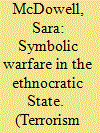

|
|
|
|
|
| Publication |
2012.
|
| Summary/Abstract |
Ethnocracies defend and protect the hegemony and territory of a dominant ethnic-nation. This article considers how paramilitary or guerrilla organisations professing to act on behalf of minority groups have used non-violent spatial practices such as memorialisation to contest the authority of the ethnocratic state and reassert their own (with varying success). Within ethnocracies where territory is fiercely contested memorialisation has the specific capacity to extend the parameters of conflict constituting a form of symbolic warfare. In exploring the nexus between memorialisation and territoriality this article reflects on the symbolic conflict between the LTTE and the Government of Sri Lanka before the former's obliteration in May 2009.
|
|
|
|
|
|
|
|
|
|
|
|
|
|
|
|
| 16 |
ID:
140125
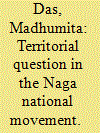

|
|
|
|
|
| Summary/Abstract |
The article concerns itself with the current phase of the Indo-Naga peace talks, seemingly rendered intransigent on the contentious issue of administrative integration of contiguous Naga-inhabited areas. It historically examines the ethno-territoriality of the Naga national movement in the states of Nagaland, Manipur, Assam and Arunachal Pradesh. This article finds that notwithstanding the soundness of the claims, Naga territoriality is not a non-negotiable given but an active construction of the changing politics of the movement. The findings suggest that any proposed federal arrangement should balance ethno-territorial urges with historical peculiarities. A substantial measure of non-territorial autonomy, in a mutually binding federal arrangement, would necessitate a redefinition of both Naga ethno-national aspirations and the post-colonial Indian state’s insecurities. However, it holds the potential for sustainable peace in the region.
|
|
|
|
|
|
|
|
|
|
|
|
|
|
|
|
| 17 |
ID:
079900
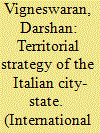

|
|
|
|
|
| Publication |
2007.
|
| Summary/Abstract |
Long-term studies of European history address the origins and evolution of state territoriality. Some scholars have suggested that the late medieval revival of European cities engendered variation in this region's territorial practices. However, their work struggles to explain the origins, nature and demise of the territorially `fragmented' Italian city-states. This study addresses this gap by shifting focus from the city's economic functions to the state-building process occurring within Italian urban walls. It shows that Italian rulers deliberately `centralised' their resources to challenge the violent actors and military installations that had become concentrated in town. This analysis strengthens the argument that coercive factors drove the early evolution of European territoriality. The work uses these findings to create fresh lines of inquiry for research on variation in modern territorial forms
|
|
|
|
|
|
|
|
|
|
|
|
|
|
|
|
| 18 |
ID:
141271
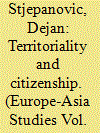

|
|
|
|
|
| Summary/Abstract |
This article deals with the issue of sub-state citizenship in the post-Yugoslav countries and focuses on the emergence and definitions of membership. The article analyses conceptions of nationhood and territorial compositions of the states, proceeds with the analysis of sub-state entities' governance arrangements and compares conceptions of nationhood and membership in state-wide and sub-state polities. The article identifies four broad categories of sub-state polities and two diverging tendencies in the definition of membership. At one end of the spectrum, there are cases in which membership in regional polities is based on territorial, multi-ethnic and civic principles. At the other end, membership is defined in ethno-national terms.
|
|
|
|
|
|
|
|
|
|
|
|
|
|
|
|
| 19 |
ID:
167183
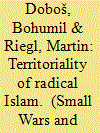

|
|
|
|
|
| Summary/Abstract |
The paper compares political territoriality of selected jihadist violent non-state actors. Looking at selected groups that attempted to control territory (Afghan Taliban, Al-Shabaab, the Islamic State), it attempts to establish a generalization regarding the use of territory by this type of violent non-state actors. To this end, it analyses connection of territory to groups´ security provision, economic activity, and identity. Despite many differences among the groups, it concludes that these groups often utilize both territorial and personal characteristics. Territoriality of these actors is reactive as they are unable to present a sustained control in contested regions.
|
|
|
|
|
|
|
|
|
|
|
|
|
|
|
|
| 20 |
ID:
080879
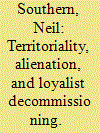

|
|
|
|
|
| Publication |
2008.
|
| Summary/Abstract |
During the Northern Ireland Troubles some Protestant communities suffered more than others. The loyalist Shankill area of West Belfast is one such place. Geographically situated between the republican strongholds of the Ardoyne and Falls, it was regularly exposed to violent attack. The area witnessed a series of republican bombings that included children in the death toll as well as many deadly shootings. Violence of this kind has left an indelible mark on the Shankill community. However, more than other loyalist areas, it was prepared to respond to republican violence with violence. But the community has not emerged from the Troubles with confidence. Unanticipated post-conflict factors of a political, cultural, and territorial nature are undermining efforts to promote community confidence and encourage paramilitary groups to decommission their weapons.
|
|
|
|
|
|
|
|
|
|
|
|
|
|
|
|
|
|
|
|
|